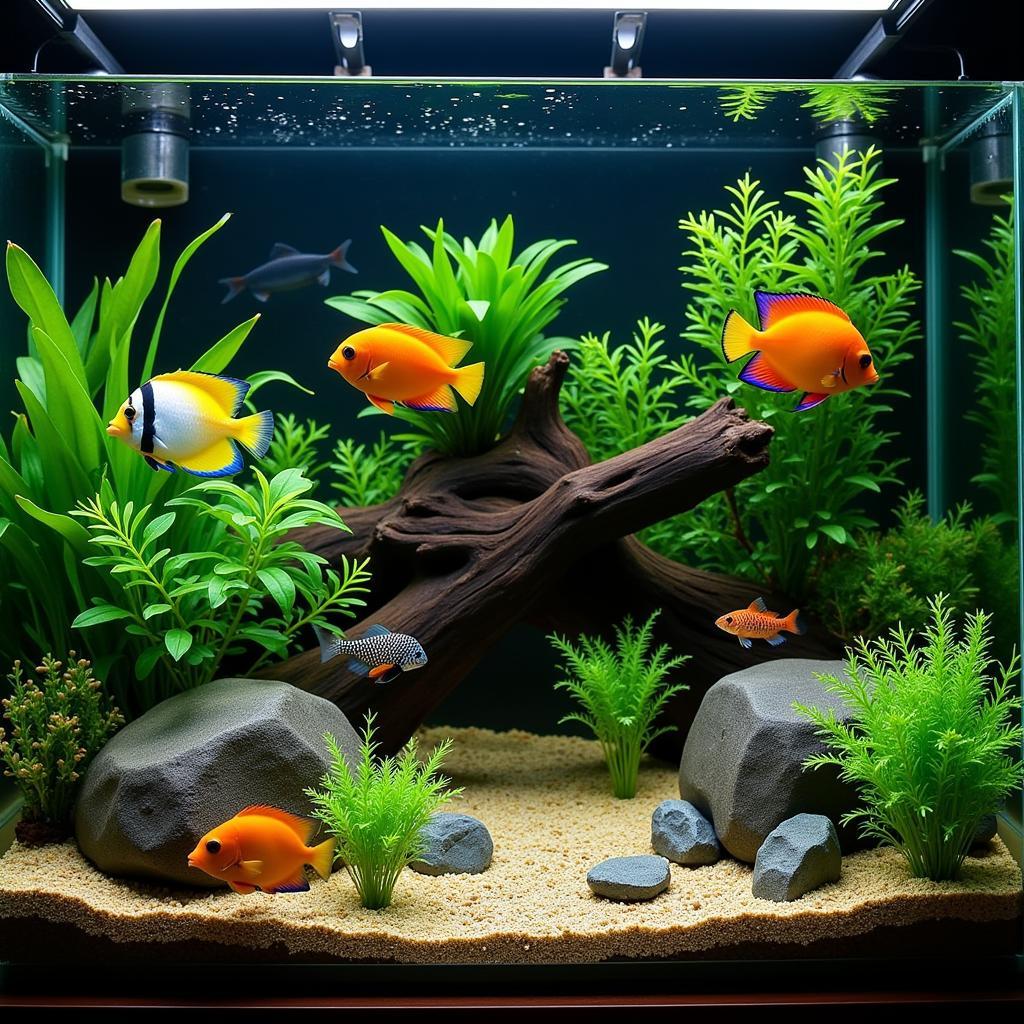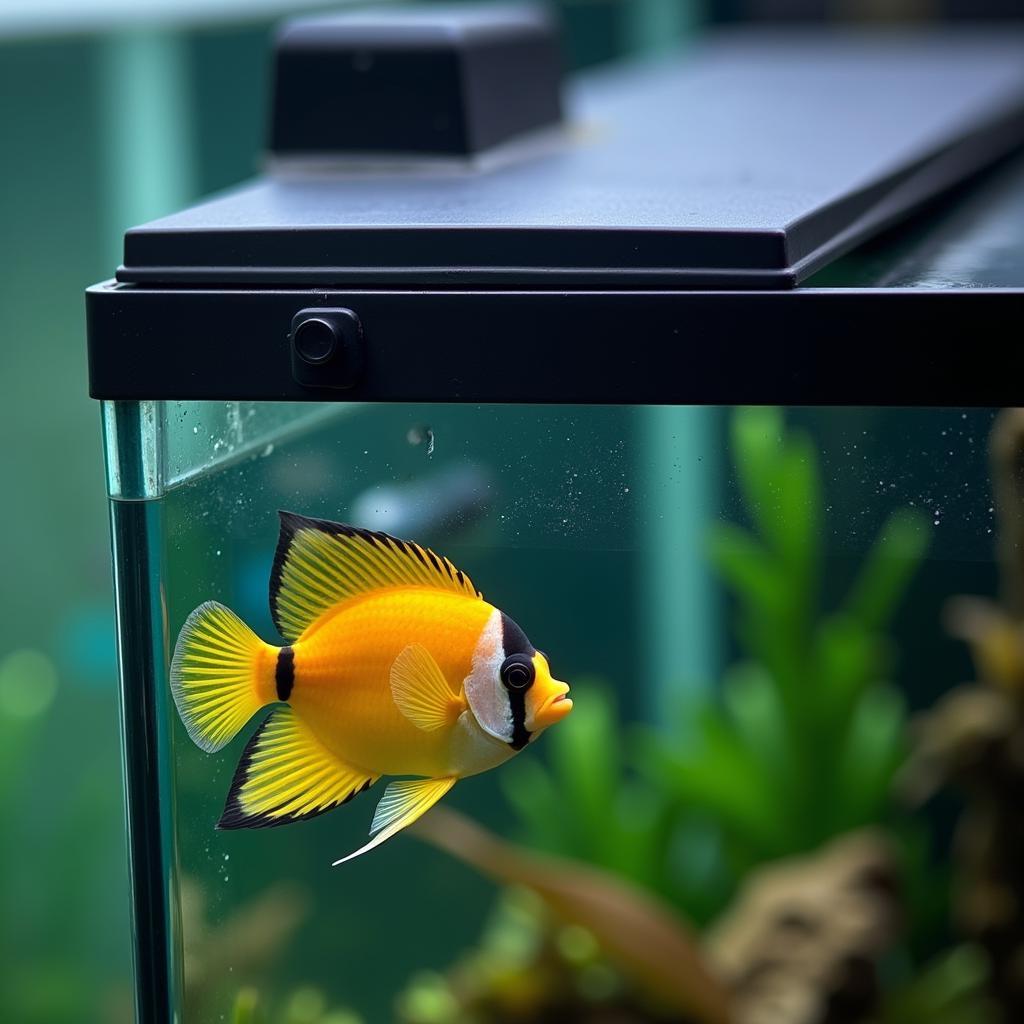African Butterfly Fish Care: A Comprehensive Guide
African butterfly fish, with their striking patterns and graceful movements, are a captivating addition to any aquarium. Understanding their unique care requirements is crucial for their well-being and longevity. This guide delves into the intricacies of African Butterfly Fish Care, equipping you with the knowledge to create a thriving environment for these beautiful creatures.  African Butterfly Fish in a well-planted aquarium with appropriate tank mates.
African Butterfly Fish in a well-planted aquarium with appropriate tank mates.
Understanding the African Butterfly Fish
African butterfly fish, scientifically known as Pantodon buchholzi, are not true cichlids, despite their common name. These unique fish are surface dwellers, native to the slow-moving, heavily vegetated waters of West and Central Africa. They possess a distinctive upturned mouth perfectly adapted for catching insects and small invertebrates from the water’s surface. Their large pectoral fins resemble butterfly wings, hence their name. Knowing this natural habitat provides valuable insights into their specific care needs. What water parameters do they prefer, and what kind of diet keeps them healthy? We’ll answer these questions and more.
Setting up the Ideal Aquarium for African Butterfly Fish
Creating a comfortable and stimulating environment is paramount for the well-being of your african butterfly fish. A spacious tank, ideally 20 gallons or more, is recommended to accommodate their active nature. A tight-fitting lid is absolutely essential, as these fish are notorious jumpers.  Secure lid on an African Butterfly Fish tank to prevent jumping. The water should be soft and slightly acidic, with a pH range of 6.0-7.5. Plenty of surface plants, such as floating ferns and water lettuce, will provide shade and replicate their natural habitat. Dim lighting also helps to mimic the shaded conditions of their native waters. Remember to include some submerged plants and driftwood to offer hiding places and break the line of sight, reducing stress.
Secure lid on an African Butterfly Fish tank to prevent jumping. The water should be soft and slightly acidic, with a pH range of 6.0-7.5. Plenty of surface plants, such as floating ferns and water lettuce, will provide shade and replicate their natural habitat. Dim lighting also helps to mimic the shaded conditions of their native waters. Remember to include some submerged plants and driftwood to offer hiding places and break the line of sight, reducing stress.
Water Parameters and Filtration
Maintaining pristine water quality is essential for the health of any fish, and african butterfly fish are no exception. Regular water changes of 25-50% every two weeks are recommended. A good quality filter is crucial for removing waste and maintaining optimal water parameters. However, avoid strong currents, as these fish prefer calm waters. Consider using a sponge filter or adjusting the flow rate of your filter to create a gentle environment.
Do you want to learn more about breeding African cichlids? Check out this resource: african cichlid fish breeding.
Feeding Your African Butterfly Fish
African butterfly fish are primarily insectivores in the wild. In the aquarium, they will readily accept live foods like fruit flies, crickets, and small mealworms. While they can be trained to accept some floating pellets or flakes, a diet rich in live food is crucial for their health and vibrant coloration. Offering a variety of live foods will ensure they receive a balanced nutritional intake. Avoid feeding them bottom-dwelling foods, as they are surface feeders and may not reach the food at the bottom of the tank.
Tank Mates for African Butterfly Fish
Choosing suitable tank mates for african butterfly fish requires careful consideration. They are generally peaceful but can be perceived as a threat by smaller, more timid fish due to their size and surface-dwelling habits. Good tank mates include peaceful, similarly-sized species that occupy different areas of the tank. Avoid aggressive fish or fin nippers, as these can stress or injure the butterfly fish. Also, avoid bottom-dwelling fish as competition for food may arise. You can learn more about breeding African butterfly cichlids here: african butterfly cichlid breeding.
If you’re interested in other African fish, you might find this article helpful: african knife fish is it compatible with oscar.
Common Health Concerns
African butterfly fish are relatively hardy when kept in the right conditions. However, like all fish, they are susceptible to certain diseases. Poor water quality, improper diet, and stress can weaken their immune system and make them vulnerable to infections. Regularly monitoring your fish for signs of illness, such as lethargy, loss of appetite, or unusual markings, is crucial. If you notice any changes in their behavior or appearance, consult a veterinarian or experienced aquarist for advice. Are you curious about breeding temperatures for African cichlids? This link provides valuable information: african cichlid breeding temperature.
Here’s another interesting read about African butterflies: african butterfly insect.
Conclusion
Providing proper african butterfly fish care ensures these fascinating creatures thrive in your aquarium. By understanding their specific needs and creating a suitable environment, you can enjoy the beauty and unique behavior of these captivating fish for years to come. Remember, a healthy and happy fish is a testament to the care and attention you provide.
FAQ
- What is the ideal tank size for African butterfly fish?
- What type of food should I feed my African butterfly fish?
- What are some suitable tank mates for African butterfly fish?
- How often should I change the water in my African butterfly fish tank?
- Are African butterfly fish difficult to care for?
- What are some signs of illness in African butterfly fish?
- Can African butterfly fish be kept in a community tank?
When you need assistance, please contact us at Phone Number: +255768904061, Email: kaka.mag@gmail.com Or visit us at: Mbarali DC Mawindi, Kangaga, Tanzania. We have a 24/7 customer service team.




